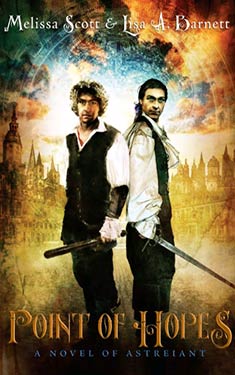Melissa Scott and Lisa A Barnett
Completed 3/20/2016, reviewed 3/21/2016
3 stars
“Point of Hopes” is the first in a cross genre series. It is a mystery set in a fantasy world where
astrology is real. It plays an important
role in everything from the politics of kingdom to helping people determine the
job best suited for them. It also can be
used to help Nicolas Rathe find the missing children of Astreiant. I picked this book up because the sequel,
“Point of Dreams” won the Lambda Literary Award, and the fourth book “Fair’s
Point” recently won the Spectrum Award.
I had high hopes for this book, but I had a lot of trouble getting
started with it, leaving me with a mediocre experience.
 I often have trouble getting started in books. It’s partly why I’ve had problems with short
stories: it takes too long to get into
the story, then its over. “Hopes” took a
lot longer than usual. There was a
prologue that was incomprehensible. It
was vague and too out of context to give me any hint as to what was coming
next. When I got to the first chapter, I
felt lost, disorienting me for the rest of the book. Once the story started, the authors throws
tons of minor characters at you in a short period of time. Everyone has a first and last name, and most
are hard to pronounce. Then, referring
to the characters by either the first or last name made it hard to follow
conversations as well as develop decent pictures of the characters.
I often have trouble getting started in books. It’s partly why I’ve had problems with short
stories: it takes too long to get into
the story, then its over. “Hopes” took a
lot longer than usual. There was a
prologue that was incomprehensible. It
was vague and too out of context to give me any hint as to what was coming
next. When I got to the first chapter, I
felt lost, disorienting me for the rest of the book. Once the story started, the authors throws
tons of minor characters at you in a short period of time. Everyone has a first and last name, and most
are hard to pronounce. Then, referring
to the characters by either the first or last name made it hard to follow
conversations as well as develop decent pictures of the characters.
Another problem I had with the book was the prose. It was quite dense in many places and broke a
rule I have for decent writing. The rule
is not to break up short sentences with line upon line of description and
simile. If you read my review of Michael
Chabon’s “The Yiddish Policemen’s Union”, I give an example of this (which I
made up myself and of which I am very proud).
Basically, it’s: Begin a
statement comma lines and lines and lines of descriptions and similes comma end
the statement. It’s one of my pet
peeves. After reading a few pages of
that, I often had to go back and read only the dialogue just so I could follow
it better. About halfway through the
book, either I got into a better groove or the authors were doing it less, but
I didn’t have to go back and reread nearly as much.
Having gotten about halfway through the book, I started to
enjoy it. It seems pretty obvious who is
stealing the children, but the why and who’s behind it all is the greater and
more fun part of the mystery. At the same time, I also began to care about the
main characters and some of the minor ones.
The series touts a gay romance between the main characters, but it barely
even buds in the first novel. There’s
just a hint of interest between them.
But there are same-sex relationships in the culture and they are simply
matter of fact and unremarkable, which is a good thing.
I give the book three stars because it got good after the tedious
two star start. I’m looking forward to
the second book because it is the award winner, and I’m hoping that means it is
written better.
No comments:
Post a Comment